
by Gideon Marcus
Justice delayed
The new Supreme Court, whose prime continuity to the old one is the preservation of the name "Warren" in its Chief Justice, is now in session—minus one Justice…for now.
Warren Burger has taken over from Earl Warren, and one can already feel the rightward lurch of our nation's highest judiciary. Now, President Richard Milhouse Nixon plans to careen the Supreme Court in an even more conservative direction.
Tricky Dick's nomination to fill the seat left when LBJ's nominee, Abe Fortas, didn't get the job, is Clement F. Haynsworth. Haynsworth is currently a United States circuit judge of the United States Court of Appeals for the Fourth Circuit (Atlantic coast of the Upper South), a position he has held since being appointed their by Ike in 1957. The Senate Judiciary Committee on October 9th approved 10-7 the consideration of Justice Haynsworth.

The road ahead is far from clement for Haynsworth, however. For one, he bought 1000 shares of Brunswick (the bowling company) just before publishing a ruling he helped make on said company. After the heightened scrutiny on ethics that accompanied the Fortas nomination, Haynsworth is under an intense microscope. Labor groups maintained that he should have recused himself from a case involving a textile mill; he owned shares of a company that did business with the mill.
Critics of the storm say this is just tit for tat after the Fortas fight, rather than for any substantive reason. What's really at stake is Haynsworth is a reactionary. He affirmed the decision by local authorities to close the Prince Edward County schools to avoid integration, he upheld the constitutionality of school voucher programs used to fund segregated private schools, and he supported the management of the Darlington Manufacturing Company in South Carolina when it closed down to avoid its employees unionizing.
Will Haynsworth make it on the bench? It's hard to imagine he will. If a Republican minority was sufficient to deny Fortas a seat, then a Democratic majority will surely roadblock Haynsworth. If and when this happens, the question is whether Nixon will double down or conciliate. At stake this season are decisions on the tax exempt status of churches, the death penalty, punitive drafting of war protesters, and the rights of Black Americans.
Stay tuned…
Entertainment delayed
Just as we're playing the waiting game to see the direction jurisprudence goes in America, so the latest issue of Galaxy science fiction makes it clear that the future of SF, particularly in the pages of the former queen of the genre, is as yet uncertain.
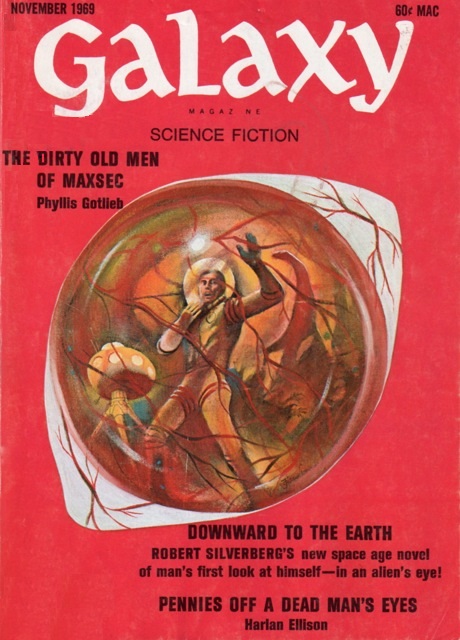
by Jack Gaughan (as are, presumably, all of the other illustrations in this magazine)
Downward to the Earth (Part 1 of 4), by Robert Silverberg
The amazingly prolific Silverbob begins a serial that has elements of Delany (the incorporation of music and the choppy presentation…which may be a printing error knowing Galaxy) and Zelazny (the wild, decadent planet and weary protagonist).

Edmund Gunderson used to run Holman's World, a jungle planet with two sentient races—philosophical elephants and brutish apes—in order to collect the serpent worm venom that is a fundamental catalyst of tissue regeneration.
Ten years later, Holman's World is now Belzegor, reverted to the ownership of the pachyderm nildoror. The human infrastructure is rapidly succumbing to tropical rot, and who knows how long humanity will keep contact with the world?
Amid this backdrop of decay, Gunderson returns to the planet he ruled…purpose unknown. All we know is that his mission lies somewhere in the backwoods, and he requires nildoror permission to go there. We find out Gunderson is a bigot who cannot quite abide the idea that the nildoror are sentient beings rather than animals, but he does seem to be trying to break free of his bigotry. We also learn that the nildoror are now closely associating with the primate sulidor and even employing them as servants. Finally, it is revealed that drinking raw serpent venom causes the brief transfer of souls between alien and human. Whether this is imaginary or real is not yet known.
Silverberg has set up a lot of pieces, but not much has happened yet. The writing is competent, though not gripping. As with the Haynsworth decision, the jury is still out on this one.
Three stars.
Pennies, Off a Dead Man's Eyes, by Harlan Ellison
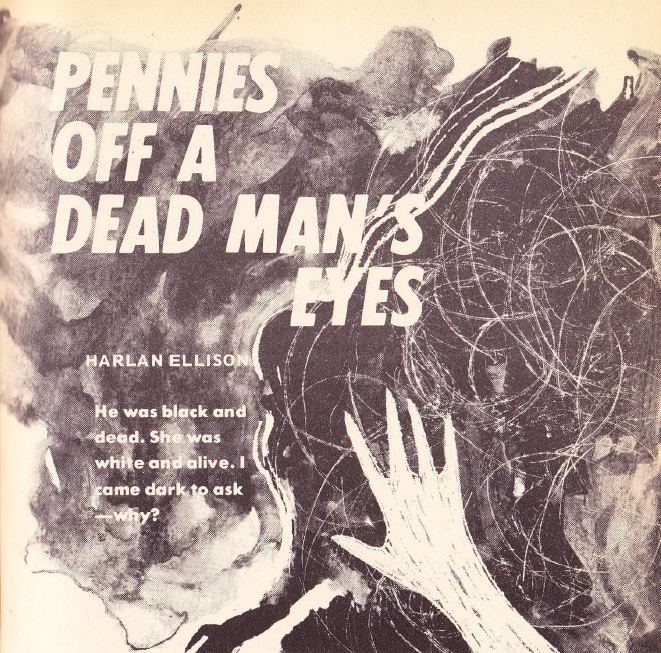
Old man Jedediah Parkman is dead at the age of 82, and all of the people he's helped over the years are coming to his funeral to pay respects. This includes an alien with the power of camouflage and lethal envelopment, who is passing for human for his survival. At the funeral, he witnesses a beautiful white woman (most out of place given the part of town and the race of Parkman and the other attendees) who takes the silver coins from atop Parkman's eyes.
What is her motivation? Why is she there? And just what connection does our storyteller have to Parkman?
This is one of the few Ellison stories that harnesses the writer's great talent to say something beyond what's on Harlan's mind/heart at the moment. It's also real SF, unlike so much of his work.
Five stars.
The Dirty Old Men of Maxsec, by Phyllis Gotlieb

Outside: the City. Cramped, stagnant, spartan. Its only compensation: the citizens are immortal, thanks to "the J."
Inside: MaxSec. A maximum security community populated by criminals whose only punishment is to be deprived of immortality.
The paradox: the people of MaxSec are reportedly happier, freer, and more innovative than the people of the City.
The story: Fenthree is a somewhat cynical citydweller, blackmailed into infiltrating MaxSec to find its secrets. He is quickly found out and imprisoned, to be an unwitting vessel for MaxSec's revenge on the outside world.
From there, the perspective of the story grows, now including Corrigan, strongman of MaxSec who is the architect of the retribution plan. To Linnaeus Ganzer, nearly 400 years old, developing the creeping death for Corrigan's plan. To Luz, the last lovely woman in MaxSec, catalyst to plans within plans.
A meandering, occasionally flippant, occasionally opaque piece, Gotlieb's is an interesting counterpoint to last month's "The Rock", covering the concept of a coordinated prison exile a la Australia of a couple centuries ago. That it also manages to make some interesting comments on the effects of immortality on society at the same time is impressive, although the two speculative threads do not interweave perfectly.
Three stars.
How to Kidnap a Moon, by Robert S. Richardson
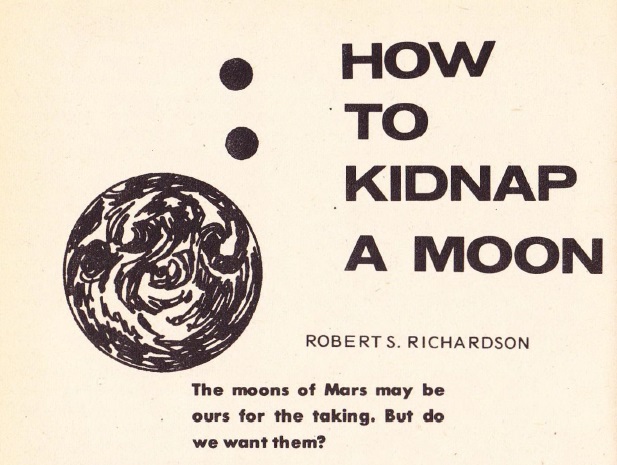
Richardson is an astronomer whom we normally find in the pages of Analog. This article details the energy concerns for bringing the two moons of Mars into orbit around the Earth for easier access.
There isn't much discussion of how one might practically arrange such things—it's all just orbital mechanics and erg tabulations. It is also unclear how it would be easier to bring the rocks here for investigation rather than exploring them in situ. On the other hand, if we're ever to mine Phobos and Deimos (or by extension, any of the asteroids), I suppose there might be merit to bringing the planetoids home. If anything, they could be hollowed out and turned into natural space stations.
Anyway, three stars.
Broke and Hungry, No Place to Go, by Ron Goulart

A man whose job is to tell the computer which unnecessary mouths on the dole to eliminate (in the pursuit of efficiency) finds that he is now on the chopping block.
This is the kind of minor tale we might have found in one of the minor magazines last decade. Ron is phoning it in.
Two stars.
For Your Information (Galaxy Magazine, November 1969), by Willy Ley
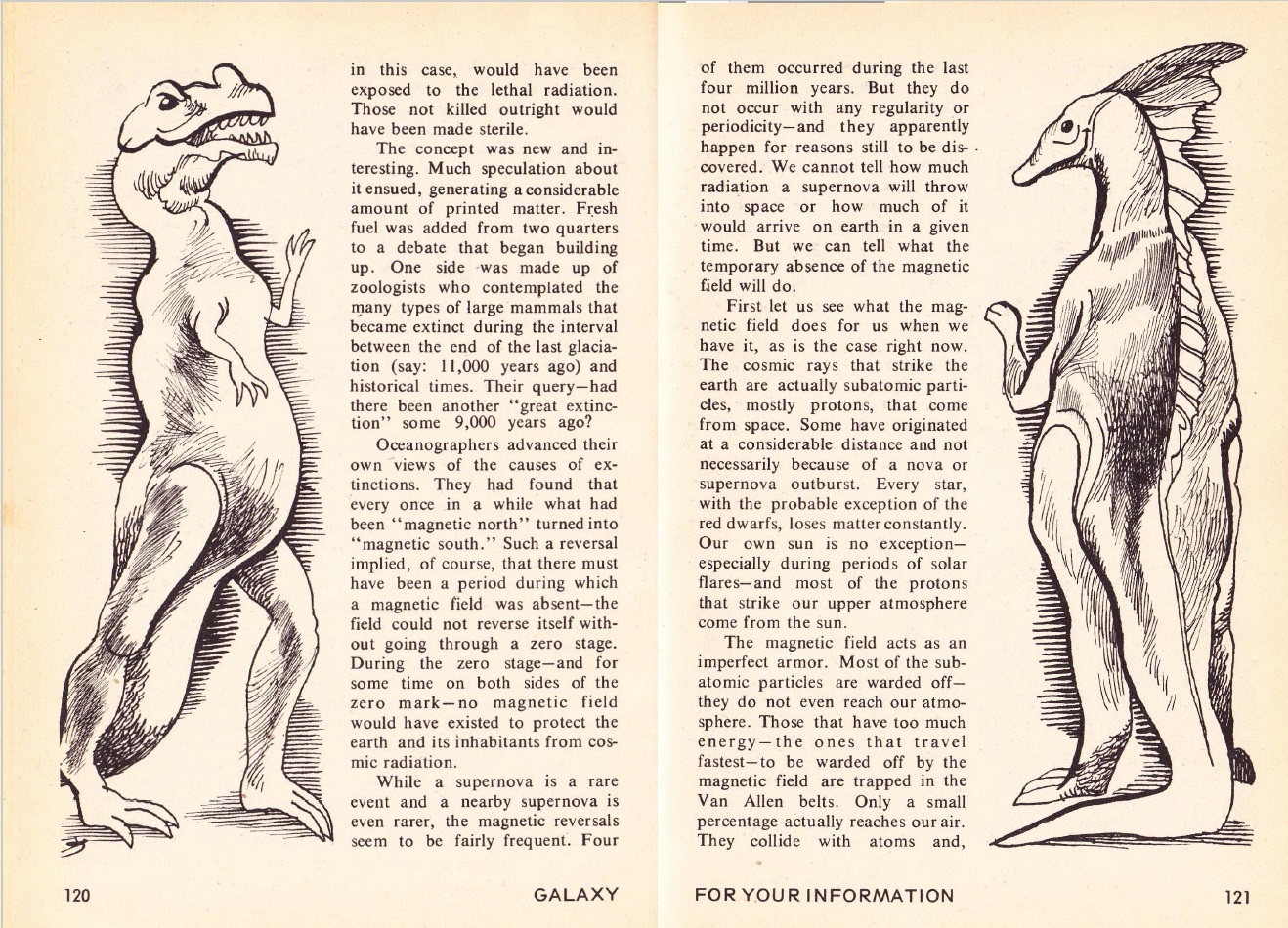
In this posthumous piece, Willy Ley discusses the suggestion that the death of the dinosaurs was caused by an excess of radiation—from the periodic flipping of the magnetic poles or the explosion of a nearby supernova. He seems unconvinced, and he even goes so far as to say that the extinctions might not even have been that sudden.
Three stars.
Dead End, by Norman Spinrad

Another bleak man-on-the-dole story. This time, a fellow who is dissatisfied with having nothing meaningful to do, decides to go to the last natural preserve in the country. It is a 10 mile by 10 mile stretch of wilderness with none of the comforts of home. When he decides he isn't enjoying being cold and hungry any more than he was enjoying being bored and fed, he tries to summon a recovery robot. But his call bracelet doesn't work…may never have been designed to work. A trap to weed out malcontents?
Mack Reynolds has extrapolated this kind of world with far more success, and Bob Sheckley has written satires like this with far more wit and barb. Spinrad can be great, but this is lesser Spinrad.
Two stars.
Dune Messiah (Part 5 of 5), by Frank Herbert
Last up, a very short final installment of the third (or second, depending on how you count them) Dune book. The plotters against Paul Atreides offer him a ghola (resurrected clone) of the newly dead Chani, Paul's true love. Knowing this will make Muad'Dib a thrall to the shadowy interests of a myriad of anti-Imperial organizations, Paul refuses. Then he goes out into the desert to die, as is the fitting end for blind Fremen. The Emperor leaves behind a newborn pair of twins, one male and one female, both fully sapient in the same manner that Paul's sister was conceived, Alia's mother having been high on the spice melange at the time.
In the end, this is very much a bridge book. All of its bits could have been condensed to a five-page faux encyclopedia article included at the beginning of the next book, with very little action and not a whole lot of interest, save the mildly engaging Duncan Idaho/Hayt bits in the last installment.
So, two stars for this bit and two stars overall. Just read the summarizing precis (almost as long as this last installment!) and the few pages of the story in this issue, and you'll be fine.
A Cautious Look to the Future
It's even harder to read the tea leaves when it comes to the future of Galaxy. On the one hand, by the numbers, this issue didn't crack three stars. On the other, the Silverberg could become a knockout, the Herbert is (blessedly) over, the Gottlieb was interesting, if not stellar (and the first woman-penned piece in how long?), and the Ellison was unusually excellent. Ley is dead, and that is a blow, but perhaps Richardson will replace him. His article certainly seems like an audition, though it wasn't as good as other pieces by him I've read in, say, Analog.
So, for news on Haynsworth and news on Galaxy… I guess we're playing the waiting game!
See you then.

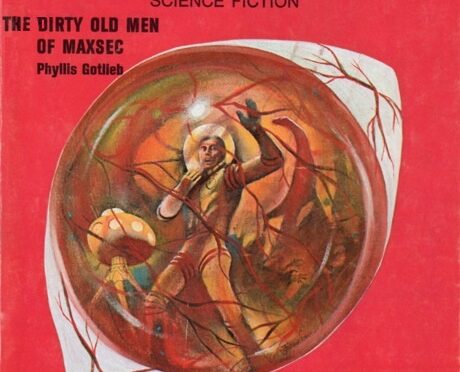


The Silverberg story is at least off to an interesting start. I have my suspicions about the relationship between the two native races, but we won't know more until next month. Given how much of science fiction has been about colonization going back to the very beginning, it's interesting to see a story about decolonization for once.
On the other hand, if I'd been Silverbob's editor, I'd have made him change the name of the character Kurtz. It draws too much attention to the bones of this story being based on "Heart of Darkness." He was much more subtle about his borrowing with "The Man in the Maze."
Harlan's story was good, but not really five stars for me. He's subtle about the parallels between the two main characters, never calling direct attention to them, but the passion that makes up his best work is missing. He's not angry about his topic, which makes his writing better, but the story just that little bit less good.
We're definitely in agreement on the Gotlieb. It meandered too much for my tastes, and frequently left me scratching my head. There were also a couple of incidents that went undeveloped and either needed to be fleshed out or dropped.
Richardson's article was all right, but I've seen better from him. Worse, too, when it comes down to it. My biggest problem was that he never addressed the question of why anyone would want to do this.
I liked the Goulart a little more than you seem to have, though I agree that he was just phoning this in. There's nothing here that he hasn't said or done in one of his other stories about extreme automation.
A decent article from Willy Ley. I wouldn't be surprised if this was inspired by the work on his book that's over in IF. There can't be too many more of these in the hopper.
I also might have liked the Spinrad a little more than you did. It's definitely lesser and nothing others haven't done before, but the telling was fair to middling.
There simply isn't enough to "Dune Messiah" to make a novel, but I'd say it needed more than just a few pages to develop fully. Say a novella's worth. It could still have been tacked on at the beginning of a novel, if Herbert does indeed plan such.
Yeah, even the bad stories weren't badly written. Just disappointing from the authors.